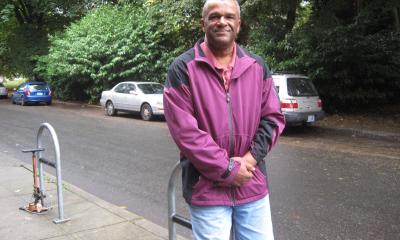This article first appeared as the Cyclist of the Month column in the November 2011 issue of the Cascade Courier, our membership newsletter.
Cyclist of the Month: RON SIMS
Age: 63
Occupation: Retired
Wheels: Mountain bike

Get Ron Sims to talk about community, and he gets excited. The volume of his speech rises, the pace of his words quickens. His eyes shine. And every time he makes a significant statement – about the importance of focusing funding for bike infrastructure improvements within King County’s low-income neighborhoods, say – he drives it home by pounding on the table between us with his right hand, for emphasis.
When I met Ron for coffee near his Mt. Baker home on a rainy morning in October, he greeted me with a hug and insisted on paying for my Americano. This former King County Executive, who recently returned home from a stint in Washington, D.C. as Deputy Secretary of the United States Department of Housing and Urban Development, is nothing if not humble. When I asked him how he’d like me to list his occupation, he told me with a smile, “I’m retired. I’m going swimming at 11.”
Retired or not, he has much to say about the need for dense urban communities connected by multi-use trails, bike lanes and transit lines. But he’s quick to point out that when he started advocating for these so-called “smart communities,” back in the ‘90s, no one had named them yet: “We didn’t call it ‘smart communities,’ ‘sustainable development’ or anything else. We just didn’t want sprawl. We weren’t going to allow that kind of growth.”
And how does bicycling fit in to those communities? “Bicycling will be our future,” he tells me. “We will have far more bicycling. The issue is whether we make infrastructure a priority.”
Ron thinks that infrastructure could be higher on his home town’s priority list. He traveled the country within his role at HUD, and he’s been impressed with what he’s seen elsewhere: “In Austin, Atlanta and Little Rock, they’re all so proud of their trails. This region assumes it has it all. But we can’t be complacent.”
He calls losing the battle for the Burlington Northern Santa Fe Trail during his term as King County Executive his “greatest disappointment.” “If we had made it a priority, we would’ve been on the world map for our trail system.” Seattle had plans for a bike share program like the one in D.C., too, “but people said it wasn’t cost-effective.” And we were supposed to have a trail to the airport, again, like the one in D.C. Ron asks, “Why does Seattle have objections to a trail near the airport when the national airport doesn’t?”
Seattle is falling short, and Ron’s sense of urgency is palpable. He knows that our health and well-being depend upon those trails; he points to research indicating that we can predict medical conditions by zip code. “Poor areas are least likely to have bicycle trails. We need to focus our efforts in these areas. We can’t spread the peanut butter too thinly.”
He continues, “If you have a park within a quarter-mile, you’ll be fit. If you have one within in a half-mile, you’ll be fit. If you have one within three-quarters of a mile, you probably won’t be fit.”
For every rebuttal, Ron has a counterpoint: “People say there are gyms, but I know gyms. Gyms are occupied by ballers. If you don’t have game, you don’t play.”
Improvements like trails, parks and bike lanes are about more than physical health. “It’s not just about nice comfortable amenities, it’s about how people act, and how they feel about their communities… When people know there’s something better and they’re not getting it, crime rates go up.” He pulls out statistics to back up this point: all other factors being equal, crime rates are 70 percent lower in communities with green around them.
We’ve made some strides, but we have a long way to go. He points to a trail he worked for in New Holly, and to bike lanes that were recently installed on Renton Avenue. But he also has a laundry list of missing connections, dead ends and bad pavement, particularly in the south end of the city. “I ride on Martin Luther King Way, but I wouldn’t take my kids on it. MLK is a bad accident waiting to happen.”
He believes that dedicated individuals, elected officials and advocacy organizations like Cascade will be the ones to move the dial. “Change hasn’t been brought about by institutions,” he tells me. “Bicycling should not be background music. It’s too essential. It needs to be an essential part of the musical score of our region.” Here’s hoping the time is coming when we’ll all enjoy that symphony together.
Share this post
